Research and Publications
In cooperation with humanitarian organizations, commercial companies and other universities in the region, the Centre is working collaboratively on various research projects and case studies, decision models and simulations and disaster modeling which analyze among others the specifics of humanitarian logistics requirements in Asia-Pacific. The gained and disseminated knowledge enriches the Centre's training and education activities and will help humanitarian actors to rapidly build up expertise and to further professionalize their work.
Please drop us an email at tlihead@nus.edu.sg for a copy of the report.
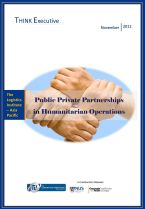
Public Private Partnership in Humanitarian Operations
November 2012In relief operations, humanitarian relief organizations (HROs) often need political and economic support from both the public and private sectors. However, very few studies have been done on the aspect of public-private partnerships in the context of humanitarian operations. We thus conduct a qualitative study to investigate the partnership between HROs with both donor and host governments as well as the private sector from donor and host countries. Based on literature reviews and field studies with several international HROs in Asia, we capture the relationship of HROs with the public and private sectors along the humanitarian supply chain. We further classify these relationships, and explore the potential collaboration areas and conflicts of interest between governments and HROs as well as between HROs and the private sector.
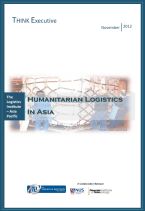
Humanitarian Logistics in Asia
November 2012
In the past two decades, we have witnessed an increasing number of natural disasters and increasing number of people affected by natural disasters in Asia [1].The keep rising casualties and growing international attention on this region piles up substantial pressure on all parties in humanitarian supply chain in Asia. HROs, with their expertise on humanitarian works, face unprecedented challenges as well as opportunities to fulfill their primary duty on relief operations and help people in need. There is an urgent call of action on HROs to improve their performance in this region. In Asia, HROs often have to face lack of government support and basic infrastructure. There is also coordination and communication problem both between HROs and other parities such as the local government and the private sector as well as among HROs. This paper provides an overview of the humanitarian logistics structure in Asia and pinpoints the main challenges involved to draw attention of the public

Humanitarian Logistics in Asia-Pacific
Challenges, Opportunities and Perspectives
November 2012
Over the last decade, Asia has largely been the region with the highest concentration of reported global disasters. Relatively little attention has been invested locally in the understanding of responsive humanitarian logistics and the requisite efficient supply chain processes. In any long term development or emergency relief operation in which goods and services are sourced and delivered, it is essential that the right humanitarian supplies reach the envisaged beneficiaries at the right time in the right quantities, in the right condition and at the right supply chain costs. In this context, supply chain management and logistics is deemed critical for both effectiveness and efficiency of the humanitarian response.
The purpose of this book is to highlight the challenges and opportunities in the field of humanitarian logistics in Asia-Pacific from the perspective of academia, humanitarian organizations and agencies and the private sector. The book is a short collection of invited action summaries from these various regional actors in Asia on Asia.
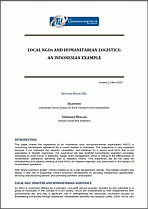
LOCAL NGOs AND HUMANITARIAN LOGISTICS: AN INDONESIAN EXAMPLE
Volume 12–Nov–SCI07
This paper shares the experience of an Indonesian local non-governmental organization (NGO) in conducting humanitarian operations for a recent disaster in Indonesia. This experience is very important because it can represent the capacity, capabilities, and initiatives by a typical local NGO that is not specialized in disaster responses. The experience will also illustrate humanitarian operation processes conducted by local NGOs, in particular, supply chain management, which is critical to the effectiveness of humanitarian operations, delivering aids to disasters victims. This experience can be the basis for strengthening and capacity building of local NGOs for disaster response, and particularly in the logistics of humanitarian operations.
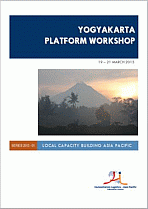
Local Capacity Building Asia Pacific – Yogyakarta
SERIES 2013 - 01
Those case studies put the workshop participants into a local emergency scenario and are supposed to emphasize the importance and complexity of logistics and supply chain management in emergency scenarios. The participants work in interdisciplinary groups to come up with a structured approach that shows the big picture of a supply chain set-up and present their results to a committee of donors. The committee which is pursuing different interests (one prefers local procurement, the other one international, one is looking for an efficient response the other one for effective response) decides in the end which group will get funding to run the operation.

LOCAL NGOs AND HUMANITARIAN LOGISTICS: AN INDONESIAN EXAMPLE
Volume 12–Nov–SCI07
This paper shares the experience of an Indonesian local non-governmental organization (NGO) in conducting humanitarian operations for a recent disaster in Indonesia. This experience is very important because it can represent the capacity, capabilities, and initiatives by a typical local NGO that is not specialized in disaster responses. The experience will also illustrate humanitarian operation processes conducted by local NGOs, in particular, supply chain management, which is critical to the effectiveness of humanitarian operations, delivering aids to disasters victims. This experience can be the basis for strengthening and capacity building of local NGOs for disaster response, and particularly in the logistics of humanitarian operations.
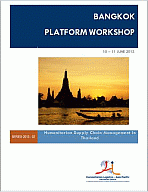
Local Capacity Building Asia Pacific – Bangkok
SERIES 2013 - 02
Those case studies put the workshop participants into a local emergency scenario and are supposed to emphasize the importance and complexity of logistics and supply chain management in emergency scenarios. The participants work in interdisciplinary groups to come up with a structured approach that shows the big picture of a supply chain set-up and present their results to a committee of donors. The committee which is pursuing different interests (one prefers local procurement, the other one international, one is looking for an efficient response the other one for effective response) decides in the end which group will get funding to run the operation.

